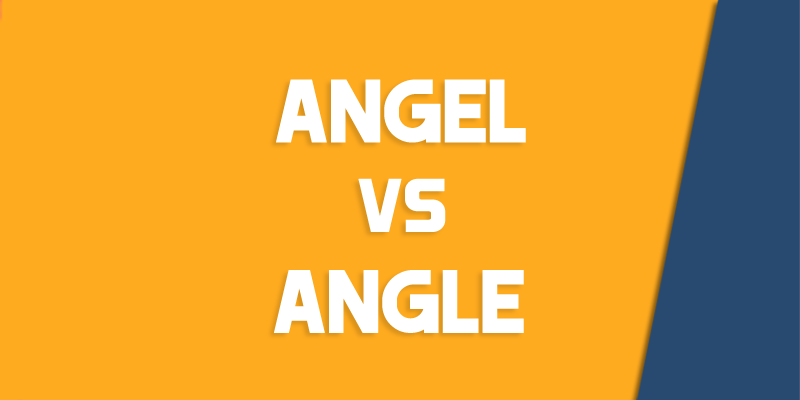Angel versus Angle – What’s the Gist?
Angel and angle are spelled almost identically, but the “l” and “e” seem to be transposed; these two commonly confused words are NOT homophones, however.
- Angel is a noun that refers to either a heavenly being or someone who is considered highly virtuous.
- Angle can be used as either a noun OR a verb.

How to Use Angel in a Sentence
Angel definition. Angel is a noun that refers to a being of some sort.
For example,
- Princess Diana’s loving attitude toward African children with HIV and AIDS caused many people to describe her as an angel.
- The driver of the wrecked Toyota claimed a guardian angel saved her life.
Angel is meant to refer to a spiritual or heavenly being, but it can be used more figuratively to refer to someone who is particularly moral or virtuous. Our first example sentence shows how you might describe a living person as an angel. The second example sentences shows how angel is used in its traditional sense: to describe a spiritual being.
How to Use Angle in a Sentence
Angle definition. Angle can be used as a noun or a verb.
As a noun, the word angle refers to one of two things: a measure of the relationship between two lines, or one’s perspective on a topic.
- A geometry test might ask a student to measure the angles of a shape.
- Tim is approaching the problem from a different angle.
As a verb, the word angle takes on many possible meanings, but the most common deals with changing the course or direction of an object.
- The fisherman angled the boat so that it was parallel with the pier.
Angle is a word that you’ll likely encounter when considering a mathematical problem, and carpenters deal with cutting wood or metal to fit a certain angle when constructing buildings or other structures.
Outside Examples of Angel and Angle
- One lawyer involved in his case tweeted out a Bible verse about an angel freeing the apostle Peter just hours before Iranian Foreign Minister Mohammad Javad Zarif broke the news in his own tweet. Washington Post
- He concluded by reciting a poem by the late Swedish Nobel laureate Tomas Transtomer in which an angel whispers “do not be afraid of being human.” Chicago Sun Times
- As we say around the newsroom, so often that the cliché approaches a truism, “There’s always a Florida angle.” Chicago Tribune
- Here are some betting angles to consider as we head into the final big weekend of college football. New York Times
Phrases that Use Angel and Angle
Guardian Angel: The movie It’s a Wonderful Life as well as countless other films and television shows mention angelic beings or the idea of a guardian angel. A guardian angel is a being that looks over you and protects you from harm. This idea can be found in Judeo-Christian texts, and even those who might not subscribe to those particular beliefs may still believe that an angelic presence watches over them and keeps them from harm.
On the side of Angels: If you are standing up for what is right and virtuous, it can be said that you are on the side of angels.
From all angles: If you have considered every possible situation or outcome, someone might say you have “looked at the situation from all angles.” If you have done this, you have considered all points of view.
How to Remember These Words
Angel and angle are two different words that are spelled almost the same, and this is typically what confuses people when attempting to choose the right word.
Angels are spiritual and moral beings; Angel, spiritual, and moral all end with the letter “L.”
Similarly, an angle is the space or slope between two lines. Space, slope, and line all end with the letter “E.”
Article Summary
Is angel or angle correct? Angels are living beings, whether you are considering celestial beings or human beings. Angles are found on construction sites or in mathematical problems.
- Angel is a noun; it is chiefly associated with a living being.
- Angle can be used as either a noun or a verb; angles are spaces between intersecting lines or someone’s viewpoint or opinion.
